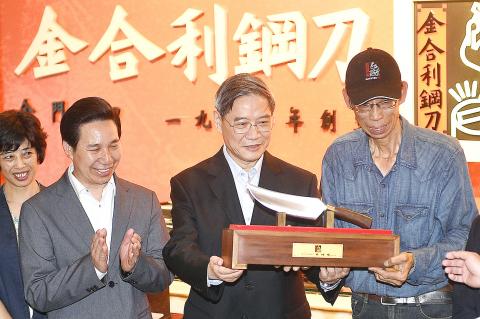China’s Taiwan Affairs Office Minister Zhang Zhijun (張志軍) yesterday discussed domestic concerns in Kinmen County such as water and power, proposing that residents in the county and those of Xiamen, Zhangzhou and Quanzhou in China’s Fujian Province are “like a family.”
Kinmen faces various challenges as it pursues development, Zhang said after a closed-door meeting with Kinmen County Commissioner Chen Fu-hai (陳福海).
“The visit was for field research to understand problems facing Kinmen and to get firsthand information, so we can study the issues further after I go back, and come up with solutions through future communications between both sides,” Zhang said.

Photo: Chen Chih-chu, Taipei Times
“A family that lives in harmony will prosper and it will succeed in all undertakings,” Zhang said, referring to a Chinese-language saying. “There is no difficulty that cannot be solved.”
One of the problems discussed in talks between Zhang and Mainland Affairs Council (MAC) Minister Andrew Hsia (夏立言) on Saturday was a pending contract between the Kinmen County Government and a Chinese Fujian Province-owned water corporation to introduce water from a reservoir in Quanzhou to Kinmen.
During a visit to the Tianpu Reservior (田埔水庫), the destination of a planned 17km undersea pipeline from Longhu in Quanzhou, MAC Deputy Minister Lin Chu-chia (林祖嘉) said the project would not only help with water shortages, but also signifies “a step forward in cross-strait relations.”
“We are looking forward to signing the contract,” Zhang said.
“We are of the same family and we all drink water from the same river,” he added.
Kinmen County Bureau of Public Works section head Chang Wu-ta (張武達) said that at the initial stage of its completion, the project would provide 25 percent of the county’s water, which currently comes from underground sources.
“Although water shortage problems have not occurred [recently], we need to look for alternative water sources so we can preserve underground water resources,” Chang said.
Residents of Kinmen have mixed feelings about the project.
An employee at Kinmen Kaoliang Liquor (金門酒廠) surnamed Hsu (許) said he believed that the project was welcomed by a majority of people in Kinmen.
“It is true that we have not faced rationed water supplies, but sufficient water supply is important for the development of the tourism industry,” Hsu said.
A 58-year-old taxi driver surnamed Chuang (莊) said he does not feel comfortable with Kinmen tapping water from China.
“The problem of lack of water has existed since I was young. We were fine without water supplies from China when there were 100,000 soldiers stationed in Kinmen in the past. Now there are only 3,000 to 4,000 soldiers here and there has been a steady process of population outflow,” he said. “However, it is true that construction of more and more bitumen roads have caused a decrease in underground water.”
The county government is also seeking to obtain electricity from China.
“Ensuring a stable supply of water and electricity is vital to Kinmen. We hope that [Beijing] will enhance its strength in offering necessary assistance to us, because people on both sides of the Taiwan Strait are close — like a family — and can work together to realize the ‘Zhonghua dream’ (中華夢),” Chen said.
In expressing his gratitude to Zhang after their meeting, Chen addressed him as lingdao (領導) from Beijing,” a Chinese term which generally means “leader.”
A county government official who wished to remain anonymous said some high-ranking executives at China’s state-owned power corporations visited Kinmen in recent years to learn about its power supply situation.
In an apparent move to dispel possible doubts about reliance on China, Zhang told reporters: “Livelihood issues should not be politicized.”
“Politics is to serve for a better livelihood. There is no way that the water we will provide people in Kinmen with is ‘political water,’” Zhang said. “We can also discuss possible solutions to the problem of power supply.”
Meanwhile, Taiwan Solidarity Union Department of Youth Affairs director Chang Chao-lin (張兆林) said the group decided not to tail Zhang as originally planned, because they had received safety threats and parents had called to express concern after an attack by unidentified black-clad menduring their protest against Zhang on Saturday.
Banners reading “Cross-Strait Peace” and “Welcome Minister Zhang Zhijun” were seen in the streets around Kinmen.
A female taxi driver said she received NT$1,500 for having a “Cross-Strait Peace” banner on her car window.

CHIPMAKING INVESTMENT: J.W. Kuo told legislators that Department of Investment Review approval would be needed were Washington to seek a TSMC board seat Minister of Economic Affairs J.W. Kuo (郭智輝) yesterday said he received information about a possible US government investment in Taiwan Semiconductor Manufacturing Co (TSMC, 台積電) and an assessment of the possible effect on the firm requires further discussion. If the US were to invest in TSMC, the plan would need to be reviewed by the Department of Investment Review, Kuo told reporters ahead of a hearing of the legislature’s Economics Committee. Kuo’s remarks came after US Secretary of Commerce Howard Lutnick on Tuesday said that the US government is looking into the federal government taking equity stakes in computer chip manufacturers that

NORTHERN STRIKE: Taiwanese military personnel have been training ‘in strategic and tactical battle operations’ in Michigan, a former US diplomat said More than 500 Taiwanese troops participated in this year’s Northern Strike military exercise held at Lake Michigan by the US, a Pentagon-run news outlet reported yesterday. The Michigan National Guard-sponsored drill involved 7,500 military personnel from 36 nations and territories around the world, the Stars and Stripes said. This year’s edition of Northern Strike, which concluded on Sunday, simulated a war in the Indo-Pacific region in a departure from its traditional European focus, it said. The change indicated a greater shift in the US armed forces’ attention to a potential conflict in Asia, it added. Citing a briefing by a Michigan National Guard senior

POWER PLANT POLL: The TPP said the number of ‘yes’ votes showed that the energy policy should be corrected, and the KMT said the result was a win for the people’s voice The government does not rule out advanced nuclear energy generation if it meets the government’s three prerequisites, President William Lai (賴清德) said last night after the number of votes in favor of restarting a nuclear power plant outnumbered the “no” votes in a referendum yesterday. The referendum failed to pass, despite getting more “yes” votes, as the Referendum Act (公民投票法) states that the vote would only pass if the votes in favor account for more than one-fourth of the total number of eligible voters and outnumber the opposing votes. Yesterday’s referendum question was: “Do you agree that the Ma-anshan Nuclear Power Plant

ENHANCED SECURITY: A Japanese report said that the MOU is about the sharing of information on foreign nationals entering Japan from Taiwan in the event of an emergency The Ministry of Foreign Affairs yesterday confirmed that Taiwan and Japan had signed an agreement to promote information exchanges and cooperation on border management, although it did not disclose more details on the pact. Ministry spokesman Hsiao Kuang-wei (蕭光偉) said the ministry is happy to see that the two nations continue to enhance cooperation on immigration control, in particular because Taiwan and Japan “share a deep friendship and frequent people-to-people exchanges.” “Last year, more than 7.32 million visits were made between the two countries, making it even more crucial for both sides to work closer on immigration and border control,” he said. Hsiao